Diomedes III sure traveled a lot during his campaigns. He also lived to a ripe old age. I would think these wars should have a toll on the Kievan treasury. Curious if his son would take a different path though.

The Kingdom of The Past
- Thread starter Mithridates_VI
- Start date
-
We have updated our Community Code of Conduct. Please read through the new rules for the forum that are an integral part of Paradox Interactive’s User Agreement.
You are using an out of date browser. It may not display this or other websites correctly.
You should upgrade or use an alternative browser.
You should upgrade or use an alternative browser.
Diomedes III sure traveled a lot during his campaigns. He also lived to a ripe old age. I would think these wars should have a toll on the Kievan treasury. Curious if his son would take a different path though.
Yeah, he lived quite old. It's always nice to have rulers that live very old because then there is long reign bonus.
Diomedes IV Pontian
Lived: 1321-1371
Ruler of Kiev: 1368-1371
King of Kievan Pontus: 1368-1371
Lived: 1321-1371
Ruler of Kiev: 1368-1371
King of Kievan Pontus: 1368-1371
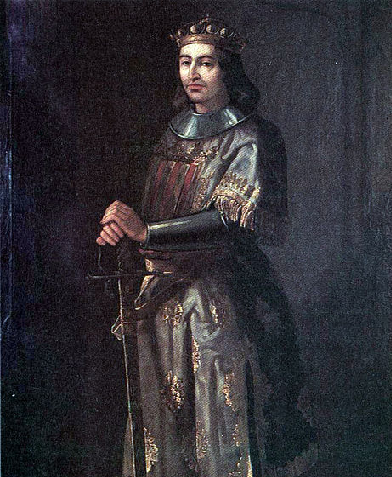
Diomedes IV was king of Kievan Pontus only for three years during the years 1368-1371. Because of his short reign, Diomedes IV has been relatively unknown to people of modern day.
In his youth, Diomedes IV joined his father to Crusade for Africa and fought by his side. However after Crusade was won, Diomedes IV returned back to Kiev even though his father continued military campaigns when he joined help Jerusalem.

Grand Prince Ivan "the Cruel", one of the most influential vassals in the whole realm, was one of the schemers against King
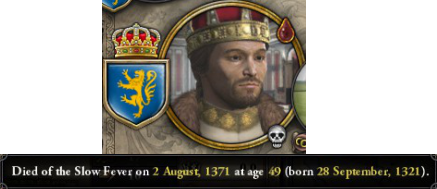
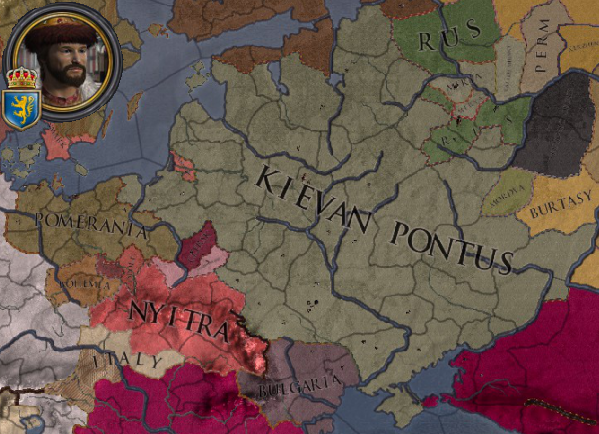
Realm of Kiev during the death of Diomedes IV
In a way, Diomedes IV's reign was short because his father's reign was quite long. 49 isn't that young so I feel bad for him. I'm getting a feeling that Mithridatir VII might be at odds with his uncle, Diomedes IV's younger brother who seems popular with some vassals.
In a way, Diomedes IV's reign was short because his father's reign was quite long. 49 isn't that young so I feel bad for him. I'm getting a feeling that Mithridatir VII might be at odds with his uncle, Diomedes IV's younger brother who seems popular with some vassals.
However the popularity of brother started to decrease by time but some still want him to crown but that's not most dangerous faction anymore.
Mithridatir VII Pontian
Lived: 1342-1396
Ruler of Kiev: 1371-1396
King of Kievan Pontus: 1371-1396
Lived: 1342-1396
Ruler of Kiev: 1371-1396
King of Kievan Pontus: 1371-1396
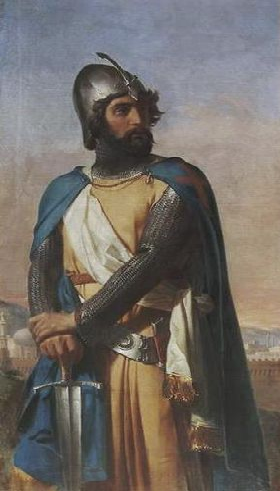
Mithridatir VII, at the age of 29, became King of Kievan Pontus during the time of tense atmosphere. His reign saw the end of stable era of Kievan Pontus, which however eventually led to situation that Mithridatir VII was able to increase his own power in relation to his vassals. His actions to weaken the most powerful vassals had big impact to the country’s history in the Late Medieval period which ultimately resulted in the falter of feudal system in Kievan Pontus.
Mithridatir VII ascended the throne whilst the Western Europe was in religious turmoil. Heretical movement called Lollardism had obtained a lot of power in Kingdom of France. Lollaridists took contol of regency which was the last straw to the Pope who finally called Crusade against France in 1375. However Mithridatir VII didn't join the Crusade because he was facing own problems. Those vassals who had planned rebellion during the reign of Diomedes IV, finally declared it.
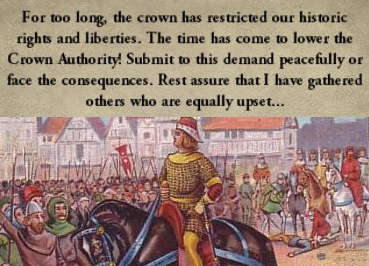
Rebel leader rallying his troops.
Rebel leaders were imprisoned and a lot of their titles were revoked. Lands were splitted to smaller pieces to prevent the new rebellions and Mithridatir VII seized part of the property of rebels and with these funded more cities to built. Those, who were also plotting against King but were not involved in rebellion, abandoned their plans.
After defeating rebellion, Mithridatir VII saw that it would be good to join to Crusade, but before he was able to start raising his troops, Crusade was already ended. Crusaders had been victorious and heretical regency was ousted. However child king was allowed to stay in power. Even though Crusade had been succesful its impact to politics of Kingom of France were not major. King himself and most of French nobles still followed Lollardy which was the main religion of France over the decade.
Mithridatir VII continued to centralize the power in Kievan Pontus to himself, but in 1382 went to help Kingdom of Italy to defend against Sunni Caliph. With the help of fellow Catholics, Italian armies were able to defeat enemies. Even though war hadn't ended yet, Mithridatir VII pulled his troops out of the war in 1383 after seeing that Italy could handle the war alone. Mithridatir VII returned to Kiev.
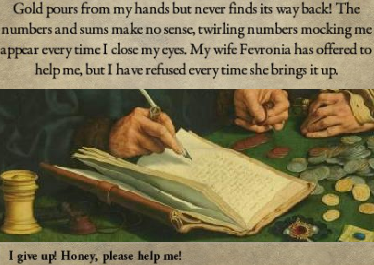
Sometimes Mithridatir VII needed to rely on his wife.
In 1393 Queen of Denmark, daughter-in-law of Mithridatir VII was begging for help against rebellion. Mithridatir VII answered to call to and started to raise his armies. Before Mithridatir VII was able to move his troops to Denmark, news from Middle East came to Kiev. Jerusalem was again facing the Jihad. Mithridatir VII ordered his troops to travel to Jerusalem to help and same time he took his personal army and travelled to Denmark.
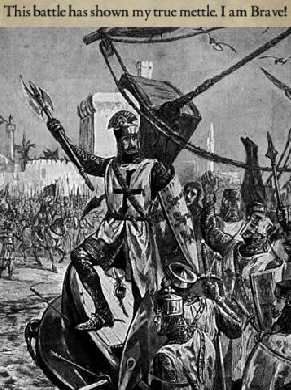
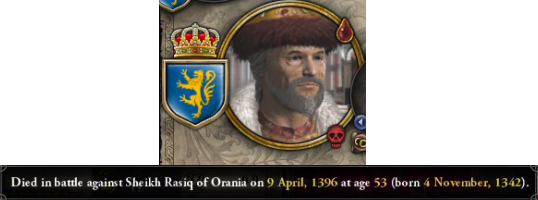
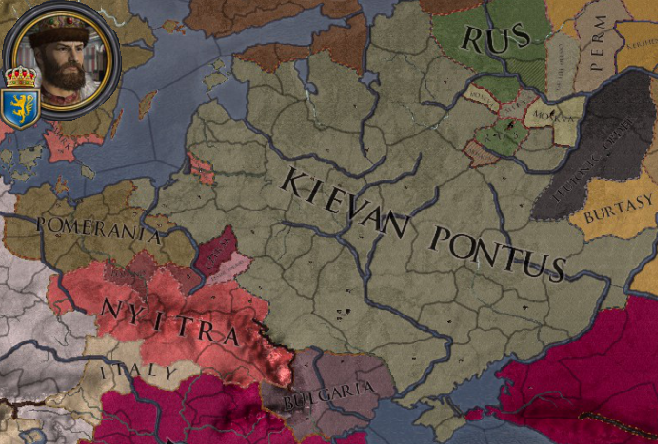
Realm of Kiev during the death of Mithridatir VII
It's a good thing these rulers live decently long lives. Otherwise, their sudden deaths could be very problematic for their successors. How stable is the realm? I'm getting the impression that there are still some discontent vassals.
Caught up again. I was very pleased when you decided to split your Empire - it was starting to become slightly too large. Your use of images is very pleasing - you're finding some great historical pics  .
.
The present borders or Kievan Pontus are pretty cool - have you considered converting over to EUIV? You must only have twor three rulers worth of ck2 left.
The present borders or Kievan Pontus are pretty cool - have you considered converting over to EUIV? You must only have twor three rulers worth of ck2 left.
It's a good thing these rulers live decently long lives. Otherwise, their sudden deaths could be very problematic for their successors. How stable is the realm? I'm getting the impression that there are still some discontent vassals.
Kingdom is not in great chaos but some instability it has. Many vassals like to make/join factions. There has been many times warning that some factions are dangerous large. So, yes there are still discontent vassals
I have thought about converting to EUIV and maybe I will do it because I have bought converter but have never really used it yet.Caught up again. I was very pleased when you decided to split your Empire - it was starting to become slightly too large. Your use of images is very pleasing - you're finding some great historical pics.
The present borders or Kievan Pontus are pretty cool - have you considered converting over to EUIV? You must only have twor three rulers worth of ck2 left.
Mithridatir VIII "the Great" Pontian
Lived: 1364-1428
Ruler of Kiev: 1396-1428
King of Kievan Pontus: 1396-1428
Lived: 1364-1428
Ruler of Kiev: 1396-1428
King of Kievan Pontus: 1396-1428
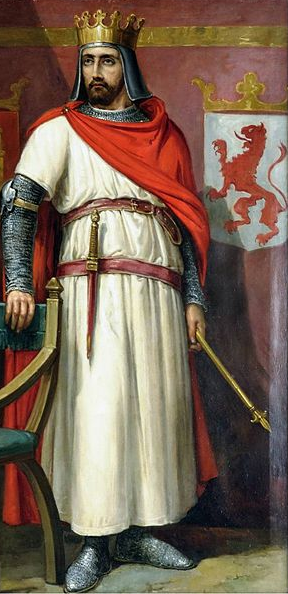
Mithridatir VIII was crowned to be King of Kievan Pontus after his father had died in Jihad in 1396. He continued his father's legacy and contributed to plans to centralization of power in Kievan Pontus. During his reign, army reforms were started. Kievan military started to rely more and more on professional armies than levies. It also reduced the influence of his vassals because now King didn't have to resort to his vassals when he needed troops.
Mithridatirs VIII's succession wasn't stable because Kievan vassals were still bitter about the fact that their power had been reduced and they thought that now was perfect time to rise in revolt when powerful king had died and new king was in power. Three months after Mithridatir VIII had been crowned, Grand Prince of Lithuania announced that King had too much power which restricted the rights of the vassals. Mithridatir VIII didn't accept their declaration which led to civil war.
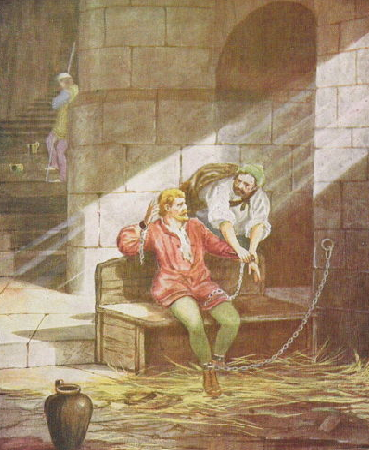
Imprisoned Rebel Leader
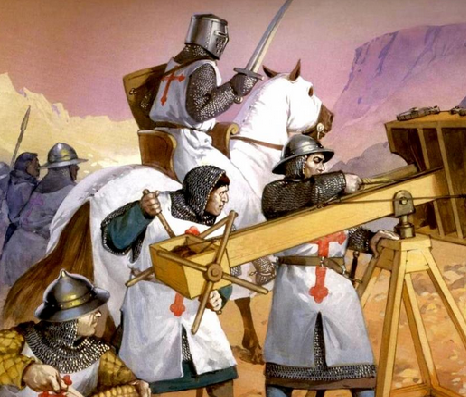
Knights Templars in defence
After returning back to Kiev, Mithridatir VIII was eager to launch new war. Western neighbor of Pomerania-Sweden was facing several civil wars. Mithridatir VIII saw this as an opportunity to weaken this powerful neighbor. Kievan armies marched to Pomerania, which was now large war zone, where they invaded Pomeranian castles and destroyed scattered enemy armies. Pomerania was too weak to fight back and finally after four years of desperate war, King of Pomerania surrendered and accepted Mithridatir VIII's claims. Intervention of Kievan Pontus impaired the possibility of Pomerania to win rebellions and, as a result, Pomeranisa lost most of its holdings in Sweden when Kingdom of Sweden split off from Pomerania and couple of dukedoms became independent.
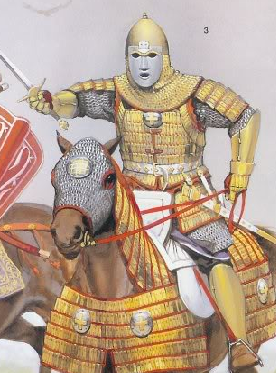
Member of Royal guards which were the loyal followers of King
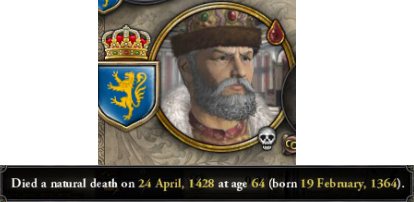
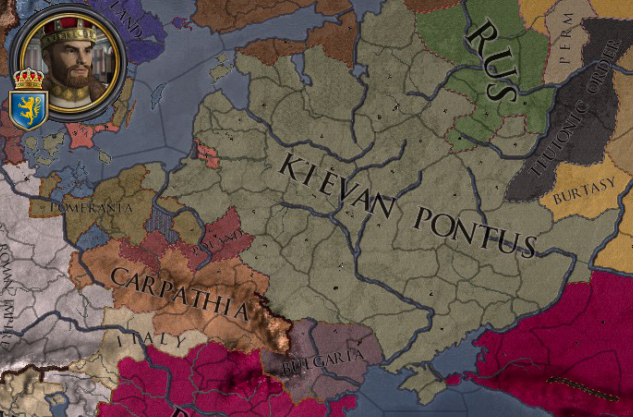
Realm of Kiev during the death of Mithridatir VIII
Those reforms should come in handy for future successors. Though, EU IV awaits following the next update.
Those reforms should come in handy for future successors. Though, EU IV awaits following the next update.
We still can have one ruler. EU4 can wait for the next. (tecnically Diomedes V continued to EU4 but he died very soon after conversion)
Diomedes V Pontian
Lived: 1386-1445
Ruler of Kiev: 1428-1445
King of Kievan Pontus: 1428-1445
Lived: 1386-1445
Ruler of Kiev: 1428-1445
King of Kievan Pontus: 1428-1445
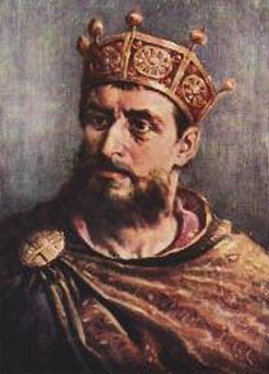
Diomedes V was King of Kievan Pontus during the late Middle Ages. His reign of 17 years has seen as the end of Middle Ages in Kievan Pontus. Diomedes V continued to finish miltary reforms which his father had started and he also was very keen to remove the last remnants of feudal system from realm. His reign of 17 years has seen as the end of Middle Ages in Kievan Pontus.
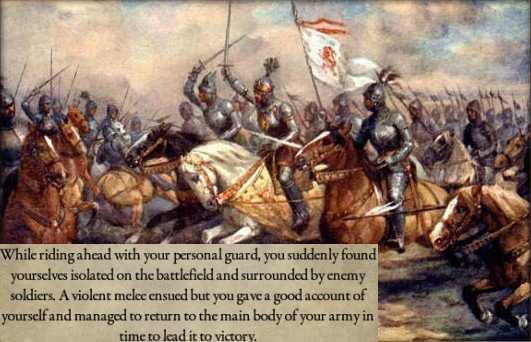
After the jihad, relations between Roman Empire and Kievan Pontus started to deteriorate in particularly when old Emperor died. Roman Empire started to see increasing military might of Kievan Pontus as a threat to itself, especially when Kievan Pontus had improved its relations with Ilkhanate. This finally escalated to break of their alliance which had lasted from the splitting of Pontian Empire.
Diomedes V started renew the old laws but soon he became worried about rumors that there was scheming to overthrow him. Vladimir Alexanderovich, Diomedes V's kinsman, had started to plan to unsurp the power and took the throne of Kievan Pontus. Vladimir was supported by group of foreign nobles who wanted to help him because Vladimir had promised to give them land and power. With their help, Vladimir was able to acquire an army and finally in 1439 he launched attack against Diomedes V.
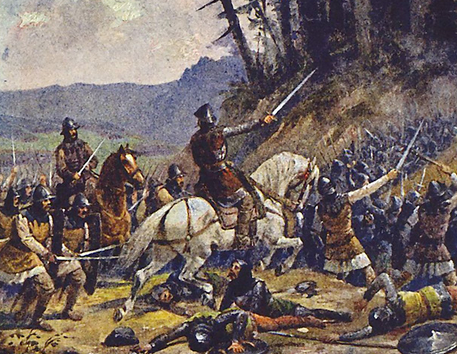
Vladimir attacking against Kievan troops.
Even though peace was back there appeared new threat. When Pomerania lost the control of Sweden, Scandinavia had become chaotic region. Many people had lost their homes and without home they needed new place to live. Danish King had been concerned about these groups of people which could try to invade new land from his kingdom. Danish King decided to solve this threat with diplomacy and convinced these people to invade new home from Kievan Pontus. Kievans were furious to Danes for these actions. Finally in 1441 this group of people launched their invasion against Kievan Pontus.
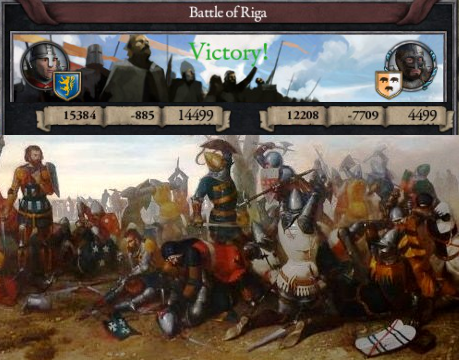
Battle of Riga
To the surprise of many, Diomedes V wasn't eager to launch revenge attack against Denmark. Some have said that due to decrepitude Diomedes V didn't care to go war anymore even thought some of the nobles insisted it.
At the end of his reign Diomedes V started to hand over his power to his son. Diomedes V's health deteriorated and finally he passed away in 1445, leaving his realm to his son, Mithridatir IX.
To be continued
Last edited:

